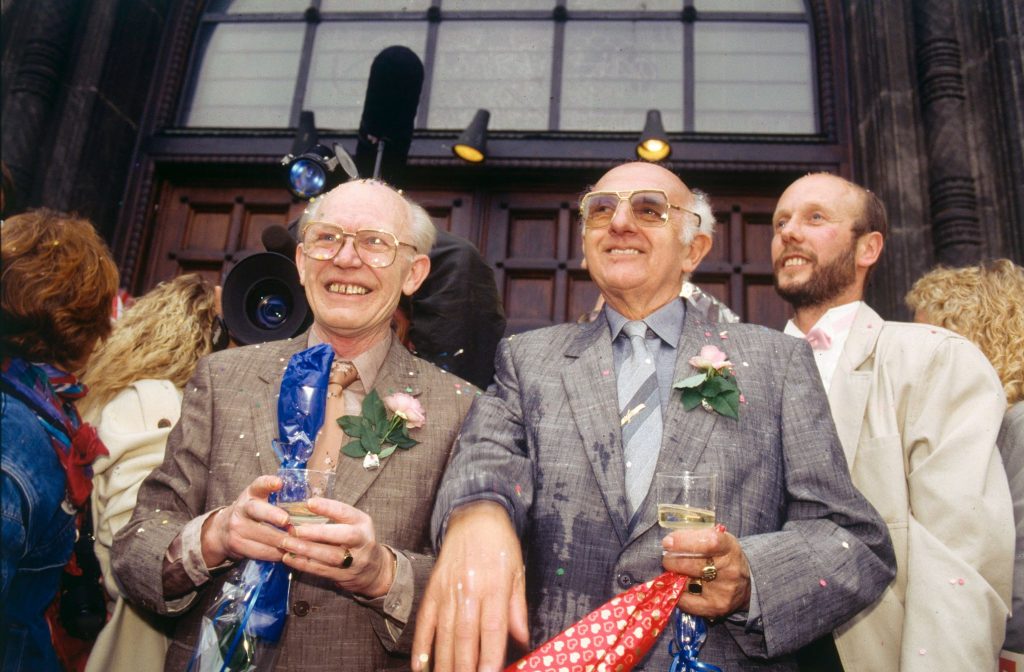
On October 1, 1989, Denmark made history by becoming the first country to legally recognize same-sex partnerships, a groundbreaking step that marked a significant shift in societal attitudes toward LGBTQ+ rights. This momentous occasion was captured by the BBC, which documented the ceremonies, highlighting a day that many viewed as a pivotal point in human rights advocacy.
In 1989, the concept of legal same-sex unions was revolutionary. Denmark’s parliament passed a law in May that year allowing gay couples to enter registered partnerships, and just five months later, 11 couples made their way to Copenhagen’s city hall for a ceremony that would change the landscape of marriage forever. While these partnerships were not labeled as marriages, they represented a monumental leap toward equality.
The unusual nature of this event attracted media attention, with the BBC’s program “Heart of the Matter” present to film the proceedings. Presenter Joan Bakewell captured the societal implications of this new law, questioning how Denmark’s decision could influence perceptions of marriage in other countries. “What lies at the heart of the matter is if one country ceases to regard marriage as solely between one man and one woman, how does that affect the way the rest of us think of it?” she posed, a question that remained relevant as the years passed.
The ceremony itself resembled traditional weddings in many respects. Couples entered a small room, where the mayor asked if they wished to enter into partnership. The first couple to sign the official documents were Axel and Eigil Axgil, who had shared their lives for 41 years. As pioneers of the gay rights movement in Denmark, the couple had endured discrimination for decades, having founded the Danish Gay and Lesbian Association in 1948. Their union was a culmination of years of struggle for recognition, and they even chose to combine their names, adopting the surname Axgil.
Ivan Larsen, an ordained Lutheran minister, and his partner Ove Carlsen also participated in this historic event. Larsen expressed profound joy at being able to share in this significant moment, stating that while they couldn’t officially call it a marriage, the recognition of their partnership was akin to it. “It is a kind of marriage. It means that now we are recognized not only as singles but also as couples,” he noted, emphasizing the emotional and social importance of their union.
However, the civil partnerships did come with limitations. At least one partner had to be a Danish citizen, the unions could not adopt children, and they could not be registered in a church. Yet, Larsen viewed their bond as equivalent to a traditional Christian marriage, believing that love between two people warranted divine blessing, regardless of the ceremony’s setting.
The AIDS crisis of the 1980s brought urgency to discussions surrounding same-sex partnerships. Dorthe Jacobsen of the Danish Gay and Lesbian Association highlighted how the organization’s outreach efforts to gay men helped foster dialogue with lawmakers, revealing the everyday realities of LGBTQ+ lives. “When you talk to people, they get to know you. They find out that you’re not a pervert. They find out that you have a very similar life to them,” she remarked.
Theodor Jørgensen, a theology professor, articulated Denmark’s pioneering role in advancing LGBTQ+ rights. He believed that by taking this first step, Denmark could inspire other countries to follow suit. “Some societies have to make the first step and take the risk,” he said, underscoring the potential ripple effect of Denmark’s decision.
Following Denmark’s lead, other Northern European nations enacted similar laws, with Norway, Sweden, and Iceland legalizing same-sex partnerships by 1996, and Finland doing so in 2002. The Netherlands became the first country to offer full marriage rights to gay couples in 2001, while the UK introduced civil partnerships in 2005. It took until 2015 for the U.S. Supreme Court to recognize same-sex marriage nationwide. Today, 36 countries have legalized same-sex marriage.
Reflecting on that pivotal day in 1989, Bakewell remarked that “something has shifted in human affairs.” The recognition of partnerships in Denmark laid the groundwork for subsequent legal advancements, culminating in the legalization of same-sex marriage in 2012. To commemorate this achievement, Larsen and Carlsen celebrated their union in a church blessing.
Looking back in 2014, Larsen humorously noted that the normalization of gay relationships had reached a point where it seemed almost mundane. “In fact, I sometimes think it has been so normal that it isn’t worth discussing,” he said, highlighting the progress made since that historic day in Copenhagen.





